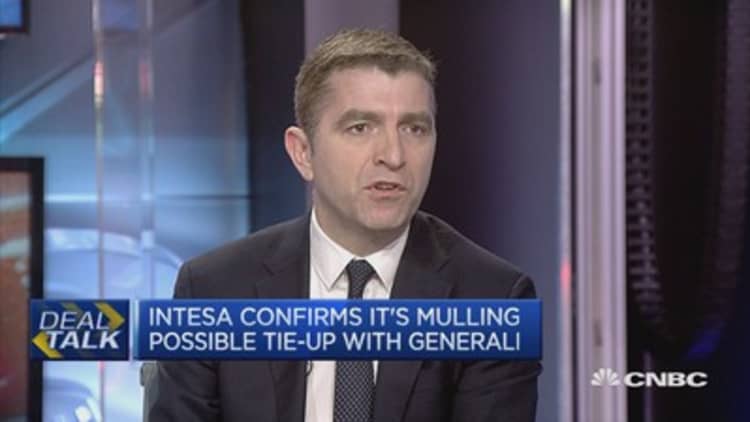
Generali has done an impressive job of refocusing its business and strengthening its balance sheet post-financial crisis and is strong enough to remain independent, Twelve Capital's insurance specialist told CNBC's Squawk Box on Wednesday.
Rumors hitting the media late Monday that Intesa Sanpaolo was considering making an offer in conjunction with German insurer Allianz were confirmed by a press release issued by the Italian bank after markets closed on Tuesday. The statement said that management was examining a range of growth options, "including possible industrial combinations with Assicurazioni Generali".
The announcement followed Generali's pre-emptive move on Tuesday to block a deal by buying a 3 percent stake in Intesa Sanpaolo.
"I don't think it needs to do a deal," argued Marcus Rivaldi,head of insurance credit and equity analytics at Twelve Capital.
"Unfortunately the share price does seem to struggle from time to time given movements in market perceptions around Italian risk but fundamentally the business is strong," he continued.
Generali's shares were trading up around 2 percent on Wednesday morning, after finishing Tuesday's session 8 percent higher on convoluted chatter of a potential bid for the company.
While a combination between Italy's number one (Intesa Sanpaolo) and number two life insurers would inevitably raise competition concerns, Rivaldi posited that the 2012 merger between Unipol and Fondiaria Sai – which required the shedding of some premia but led to notable cost savings – set a positive precedent for working around anti-trust issues.
"I don't think these are insurmountable….I think there may well be a route by which anti-trust authorities can make this work," he opined.
Rivaldi also pointed to the combination of the U.K. bank Lloyds with compatriot insurer Scottish Widows as an example of the rising appeal of tie-ups for companies within these financial services sub-sectors.
"Insurance products have changed massively over recent years, dropping a lot of risk, investment guarantees etc. and morphing more towards asset management type of products - more capital light in nature - so they're more suitable for banks to be invested in these businesses," he explained.
Reverting to the specific possibility of an Intesa Sanpaolo and Generali merger, Rivaldi affirmed that he saw strong industrial logic in this deal happening, despite investors' apparent scepticism.
"I don't think the market is pricing in yet this deal happening. If you look at M&A premia that we see in the insurance sector, it's typically 25 – 40 percent and clearly Generali's share price has not moved that much as yet. So I think the market continues to place a discount on this deal happening," the insurance expert contended.
Analysts have also raised the speculative possibility of French insurer AXA joining the fray, an idea which Rivaldi suggests merits the same industrial logic as a potential Allianz deal.
However, Rivaldi believes it unlikely that Generali will succumb without a fight to any potential bidder.
"Generali sees itself having a very clear, independent future if it wants it. And so I think we shouldn't discount a defensive approach from Generali," he concluded.


